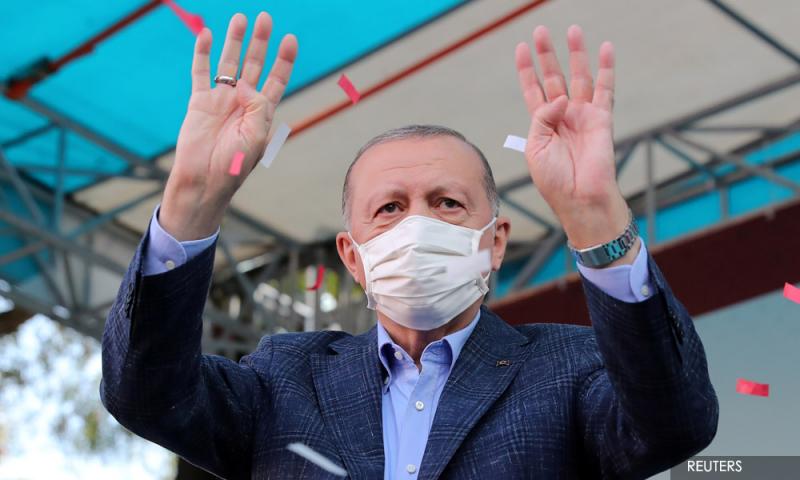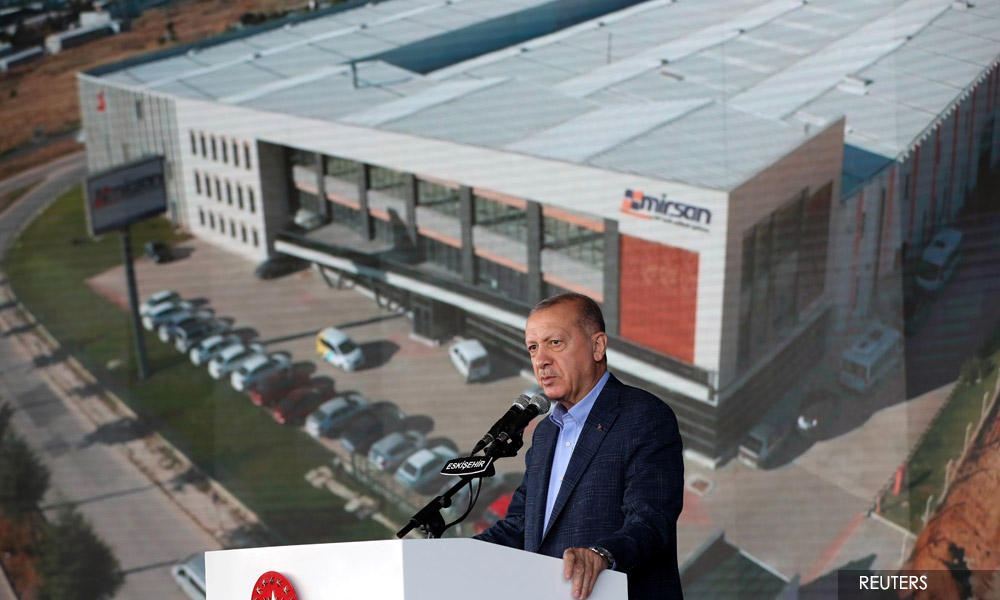
Turkey to expel US envoy and nine others, Erdogan says
Turkish President Tayyip Erdogan said on Saturday that he told his foreign ministry to expel the ambassadors of the United States and nine other Western countries for demanding the release of philanthropist Osman Kavala.
Seven of the ambassadors represent Turkey's Nato allies and the expulsions, if carried out, would open the deepest rift with the West in Erdogan's 19 years in power.
Kavala, a contributor to numerous civil society groups, has been in prison for four years charged with financing nationwide protests in 2013 and with involvement in a failed coup in 2016.
He has remained in detention while his latest trial continues and denies the charges.
In a joint statement on Oct 18, the ambassadors of Canada, Denmark, France, Germany, the Netherlands, Norway, Sweden, Finland, New Zealand, and the United States called for a just and speedy resolution to Kavala's case, and for his "urgent release".
They were summoned by the foreign ministry, which called the statement irresponsible.
"I gave the necessary order to our foreign minister and said what must be done: These 10 ambassadors must be declared persona non grata (undesirable) at once. You will sort it out immediately," Erdogan (above) said in a speech in the northwestern city of Eskisehir.
"They will know and understand Turkey. The day they do not know and understand Turkey, they will leave," he said to cheers from the crowd.
The US and French embassies and the White House did not immediately respond to requests for comment.

A US State Department spokesperson said it was aware of the reports and was seeking clarity from the Turkish Ministry of Foreign Affairs.
Erdogan has said previously that he plans to meet US President Joe Biden at a summit of the Group of 20 (G20) major economies in Rome, Italy next weekend.
One diplomatic source said de-escalation was possible given Turkey has now made its stance very clear, and given the potential diplomatic fallout from such a move ahead of the G20 summit and the UN climate summit in Glasgow, Scotland starting at the end of the month.
"No instructions have been given to embassies," the source said, adding that it was possible a decision may be taken at Turkey's cabinet meeting on Monday.
Norway said its embassy had not received any notification from Turkish authorities.
"Our ambassador has not done anything that warrants an expulsion," said the ministry's chief spokesperson, Trude Maaseide, adding that Turkey was well aware of Norway's views.
"We will continue to call on Turkey to comply with democratic standards and the rule of law to which the country committed itself under the European Human Rights Convention," Maaseide said.
'Authoritarian drift'
Kavala was acquitted last year of charges related to the 2013 protests, but the ruling was overturned this year and combined with charges related to the coup attempt.
Rights groups say his case is emblematic of a crackdown on dissent under Erdogan.
Six of the countries involved are EU members, including Germany and France.
European Parliament President David Sassoli tweeted: "The expulsion of 10 ambassadors is a sign of the authoritarian drift of the Turkish government. We will not be intimidated. Freedom for Osman Kavala."
Danish Foreign Minister Jeppe Kofod said his ministry had not received any official notification but was in contact with its friends and allies.
"We will continue to guard our common values and principles, as also expressed in the joint declaration," he said in a statement.
A source at the German Foreign Ministry also said the 10 countries were consulting with one another.
Kavala said on Friday he would no longer attend his trial as a fair hearing was impossible after recent comments by Erdogan.
Erdogan was quoted on Thursday as saying the ambassadors in question would not release "bandits, murderers, and terrorists" in their own countries.
The European Court of Human Rights (ECHR) called for Kavala's immediate release two years ago.
It said there was no reasonable suspicion that he had committed an offence, and finding that his detention had been intended to silence him.
It issued a similar ruling this year in the case of Selahattin Demirtas, former head of the pro-Kurdish Peoples' Democratic Party (HDP), who has been held in jail for nearly five years.
The Council of Europe, which oversees the implementation of ECHR decisions, has said it will begin infringement proceedings against Turkey if Kavala is not released.
The next hearing in Kavala's trial is on Nov 26.
Seven of the ambassadors represent Turkey's Nato allies and the expulsions, if carried out, would open the deepest rift with the West in Erdogan's 19 years in power.
Kavala, a contributor to numerous civil society groups, has been in prison for four years charged with financing nationwide protests in 2013 and with involvement in a failed coup in 2016.
He has remained in detention while his latest trial continues and denies the charges.
In a joint statement on Oct 18, the ambassadors of Canada, Denmark, France, Germany, the Netherlands, Norway, Sweden, Finland, New Zealand, and the United States called for a just and speedy resolution to Kavala's case, and for his "urgent release".
They were summoned by the foreign ministry, which called the statement irresponsible.
"I gave the necessary order to our foreign minister and said what must be done: These 10 ambassadors must be declared persona non grata (undesirable) at once. You will sort it out immediately," Erdogan (above) said in a speech in the northwestern city of Eskisehir.
"They will know and understand Turkey. The day they do not know and understand Turkey, they will leave," he said to cheers from the crowd.
The US and French embassies and the White House did not immediately respond to requests for comment.

A US State Department spokesperson said it was aware of the reports and was seeking clarity from the Turkish Ministry of Foreign Affairs.
Erdogan has said previously that he plans to meet US President Joe Biden at a summit of the Group of 20 (G20) major economies in Rome, Italy next weekend.
One diplomatic source said de-escalation was possible given Turkey has now made its stance very clear, and given the potential diplomatic fallout from such a move ahead of the G20 summit and the UN climate summit in Glasgow, Scotland starting at the end of the month.
"No instructions have been given to embassies," the source said, adding that it was possible a decision may be taken at Turkey's cabinet meeting on Monday.
Norway said its embassy had not received any notification from Turkish authorities.
"Our ambassador has not done anything that warrants an expulsion," said the ministry's chief spokesperson, Trude Maaseide, adding that Turkey was well aware of Norway's views.
"We will continue to call on Turkey to comply with democratic standards and the rule of law to which the country committed itself under the European Human Rights Convention," Maaseide said.
'Authoritarian drift'
Kavala was acquitted last year of charges related to the 2013 protests, but the ruling was overturned this year and combined with charges related to the coup attempt.
Rights groups say his case is emblematic of a crackdown on dissent under Erdogan.
Six of the countries involved are EU members, including Germany and France.
European Parliament President David Sassoli tweeted: "The expulsion of 10 ambassadors is a sign of the authoritarian drift of the Turkish government. We will not be intimidated. Freedom for Osman Kavala."
Danish Foreign Minister Jeppe Kofod said his ministry had not received any official notification but was in contact with its friends and allies.
"We will continue to guard our common values and principles, as also expressed in the joint declaration," he said in a statement.
A source at the German Foreign Ministry also said the 10 countries were consulting with one another.
Kavala said on Friday he would no longer attend his trial as a fair hearing was impossible after recent comments by Erdogan.
Erdogan was quoted on Thursday as saying the ambassadors in question would not release "bandits, murderers, and terrorists" in their own countries.
The European Court of Human Rights (ECHR) called for Kavala's immediate release two years ago.
It said there was no reasonable suspicion that he had committed an offence, and finding that his detention had been intended to silence him.
It issued a similar ruling this year in the case of Selahattin Demirtas, former head of the pro-Kurdish Peoples' Democratic Party (HDP), who has been held in jail for nearly five years.
The Council of Europe, which oversees the implementation of ECHR decisions, has said it will begin infringement proceedings against Turkey if Kavala is not released.
The next hearing in Kavala's trial is on Nov 26.

Erdogan is the Middle East Bully, like Putin or Modern Mao Junior…ha ha ha….no wonder Toonsie likes him….
ReplyDeleteKavala’s court case has been deliberately dragged on for years while he is kept locked up prison; even though he has never been convicted of anything.
We have ISA, detention without trial, Turkey has detention without conviction.
Opposite to Malay-sia where we drag Jibby’s court case for years, even after he has been convicted, while allowing him to run around willy nilly, live in luxury, refuse to pay back taxes, we even return his paspot for international travel.
Blurred mfer, don't u think it's just a page picked from yr uncle sam's gimmicky fart?
DeleteOooop… u won't know, box u never care to investigate!
Erdogan's Turkey has lately become an arrogant, swell headed Bully. Especially with its new-found Best Buddies Russia, Iran and China.
ReplyDeleteFor all the chest beating, Turkey is a lower middle-income country with a GDP per capita significantly lower than Malaysia's, major balance of payment problems, huge debts and a very weak currency.
Turkey better think three times before burning their bridges with the major Western economies.
Not If, but When Turkey gets into major trouble next time, Washington may just tell them... go look for help from your new Buddies...
Turkey is a member of NATO.
DeleteArticle 5 of NATO alliance stipulates the casus foederis. It commits each member state to consider an armed attack against one member state, in Europe or North America, to be an armed attack against them all.
So how?
Wakakakakaka… a way out is to use that common fluidity in interpreting pledged allegiance as the toilet paper!
Ooop… Turkey has its new-found Best Buddies Russia, Iran and China.
Wow… what a f*cked reader of international politics!